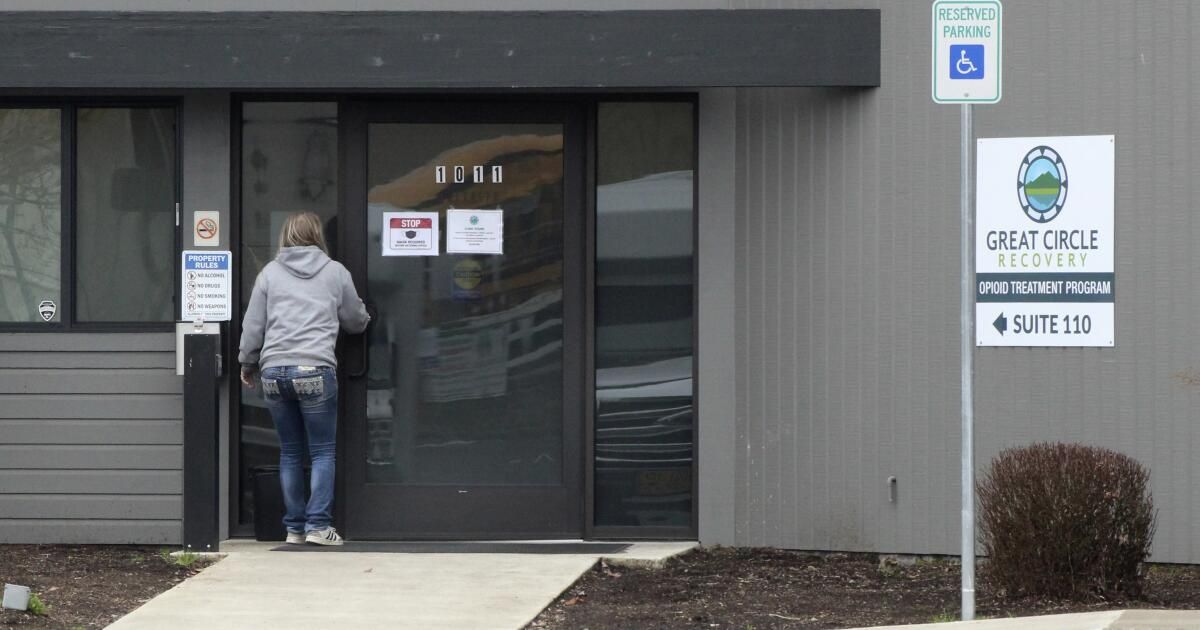In a move widely hailed as a failure of the drug decriminalization movement, Oregon reinstated criminal penalties for low-level drug possession in April. Headlines attributed this policy change to mounting overdoseevoking a crisis in the state.
In reality, the overdose rate in Oregon remains at the level middle of the pack Nationally, more than half of U.S. states have a higher number of deaths per capita. But increasing homelessness and visible drug use have spurred a drug panic, which overturned statistics and scientific recommendations, and offered a warning about the fight for sensible drug laws.
In 2020, a majority of Oregon voters approved decriminalization through Measure 110, a landmark ballot measure that made simply possessing a small amount of drugs for personal use subject to a citation rather than jail. It diverted tax revenue from cannabis, which the state legalized for recreational use in 2014; In its first round of subsidies alone, the measure instilled $300 million into the state's frayed drug treatment system and funded harm reduction services.
These were solid steps, backed by decades of addiction science and consistent with United Nations recommendations in support of drug decriminalization. Other nations, including Portugal, Spain and Uruguayhave had success with similar shifts from arrest to healthcare-based approaches.
However, the same year Measure 110 was passed, fentanyl use increased dramatically on the West Coast. Despite nearly a decade of advance warning of the fentanyl crisis in the East, the region failed to prepare. Like other Western states, overdose rates in Oregon skyrocketed, from one of the lowest in the country to nearly reaching the national average in 2022. data Although they suggest drug use rates in Oregon have remained fairly stable in recent years, fentanyl creates a much deadlier drug supply. At the same time, the number of homeless people in Oregon has increased. quickly. As more people live outdoors, more drug use that used to happen behind closed doors now happens in plain sight.
The combination of these factors fueled the perception that Oregon's drug crisis was exceptionally serious. Although investigation shows that drug decriminalization did not increase the death rate and widely supports its maintenance to reduce the harm and waste of incarceration, Measure 110 became a scapegoat for Oregon's social problems. democrats, including Portland's typically progressive district attorneythey revoked their support and, in effect, repealed it.
Criminal penalties do little to affect drug use rates. Typically, they simply increase the degree to which people with addiction oscillate between the streets and jail, a cycle of incarceration and release. known for driving overdose deaths. Occasional anecdotes of people finding their path to recovery through contact with the criminal justice system are outliers. If police massively increase arrests of people who use drugs, the consequence will be an increase in overdose deaths. predictable result.
Countries like Portugal and Norway have followed a well-defined alternative path to reduce drug-related deaths and public drug use. Steps include: Expand opportunities for compassionate contact with the system, such as free walk-in clinics for vulnerable people who use drugs. Make buprenorphine and methadone, medications that treat opioid addiction, easier and more affordable to access than street fentanyl. Give security to people, controlled spaces to keep their drug use out of the public sphere while connecting with healthcare and housing. Defend their human dignity and help them build positive relationships with health professionals and social workers. Drug decriminalization is worthwhile, but it is no substitute for these broader solutions.
Public drug use and tent-lined streets are distressing for many Oregonians. They also provide images that are easily exploited by mainstream media and politicians to stoke public fears. But drug recriminalization is unlikely to reduce homelessness or eliminate public drug use.
Although blaming drugs for homelessness is a common misconception, scientific studies consensus shows that rising housing costs are the most important cause. And Oregon simply does not have enough shelter beds or public housing options for those affected by extremely steep increases in those costs. The state also struggles to hospitalize people who need treatment for serious mental illnesses, both because there are no beds available and because its laws prevent holding people involuntarily in many casesincluding serious episodes of psychosis.
Oregon's public safety system is struggling. Calling 911 often means being on hold for several minutes. There is often no ambulances for release. the police were needed 21 minutes on average to respond to a high priority crime since last year, five minutes more than the previous year.
These real public safety issues demand urgency. They also have nothing to do with the fact that drug users were not arrested for possession. Under Measure 110, theft, public indecency, assault, and drug sales remained illegal. Focusing on punishing people who use drugs will further strain the police force without solving the larger problems.
Measure 110 took steps in the right direction by investing in social services. However, a single round of funding cannot undo decades of inadequate spending on addiction treatment and prevention. It takes years to build strong mental health, substance treatment, and public housing systems.
With the housing and overdose crises worse than ever in the country, what is happening in Oregon is not unique. Similar tensions are playing out in San Francisco, Philadelphia, Boston and other cities between scientific approaches to addiction and concerns about homelessness and public drug use. Our task is to resist the temptation to give in to panic and instead commit to evidence-backed solutions.
Morgan Godvin (@MorganGodvin) is a lifelong Oregonian, writer and drug policy researcher who served in the Measure 110 Oversight and Accountability Council and the Multnomah County Local Public Safety Coordinating Council. Joseph Friedman (@JosephRFriedman) is a UCLA researcher who has published widely on the overdose crisis in the United States.












